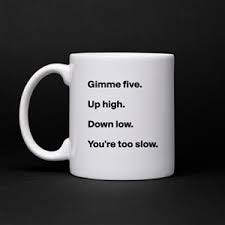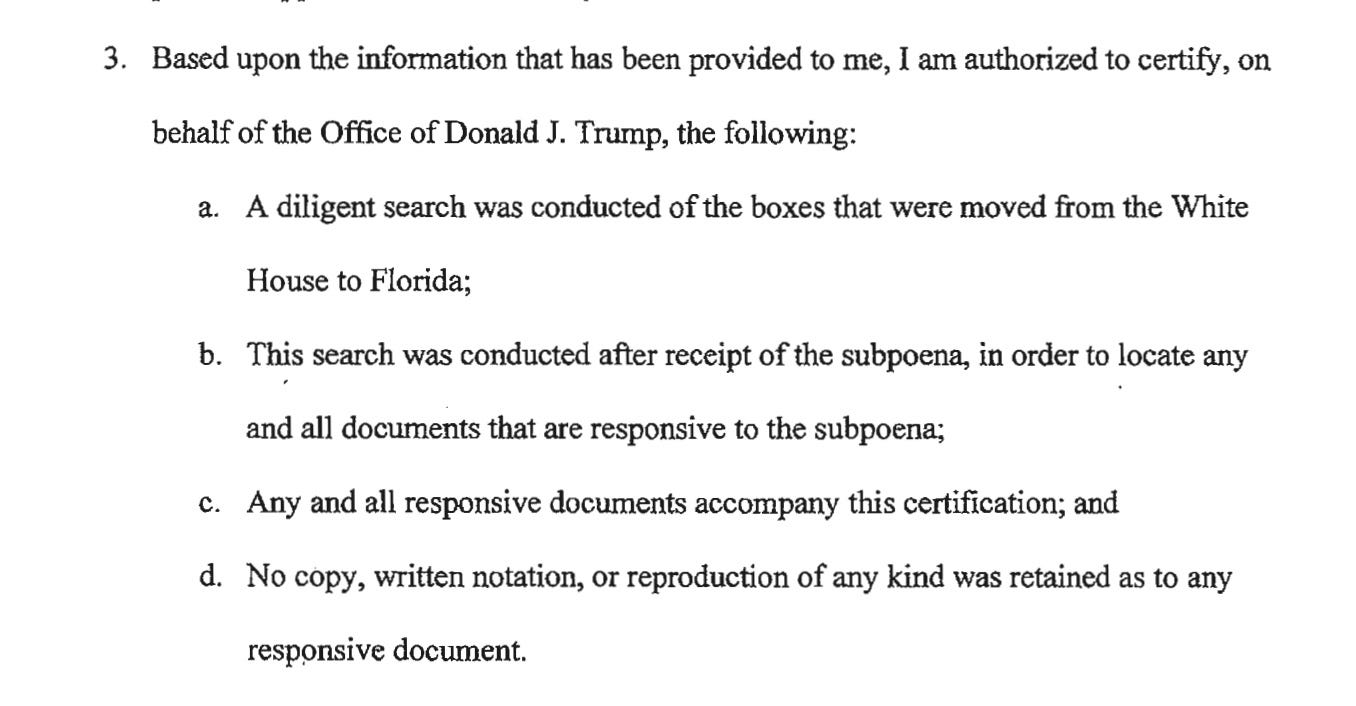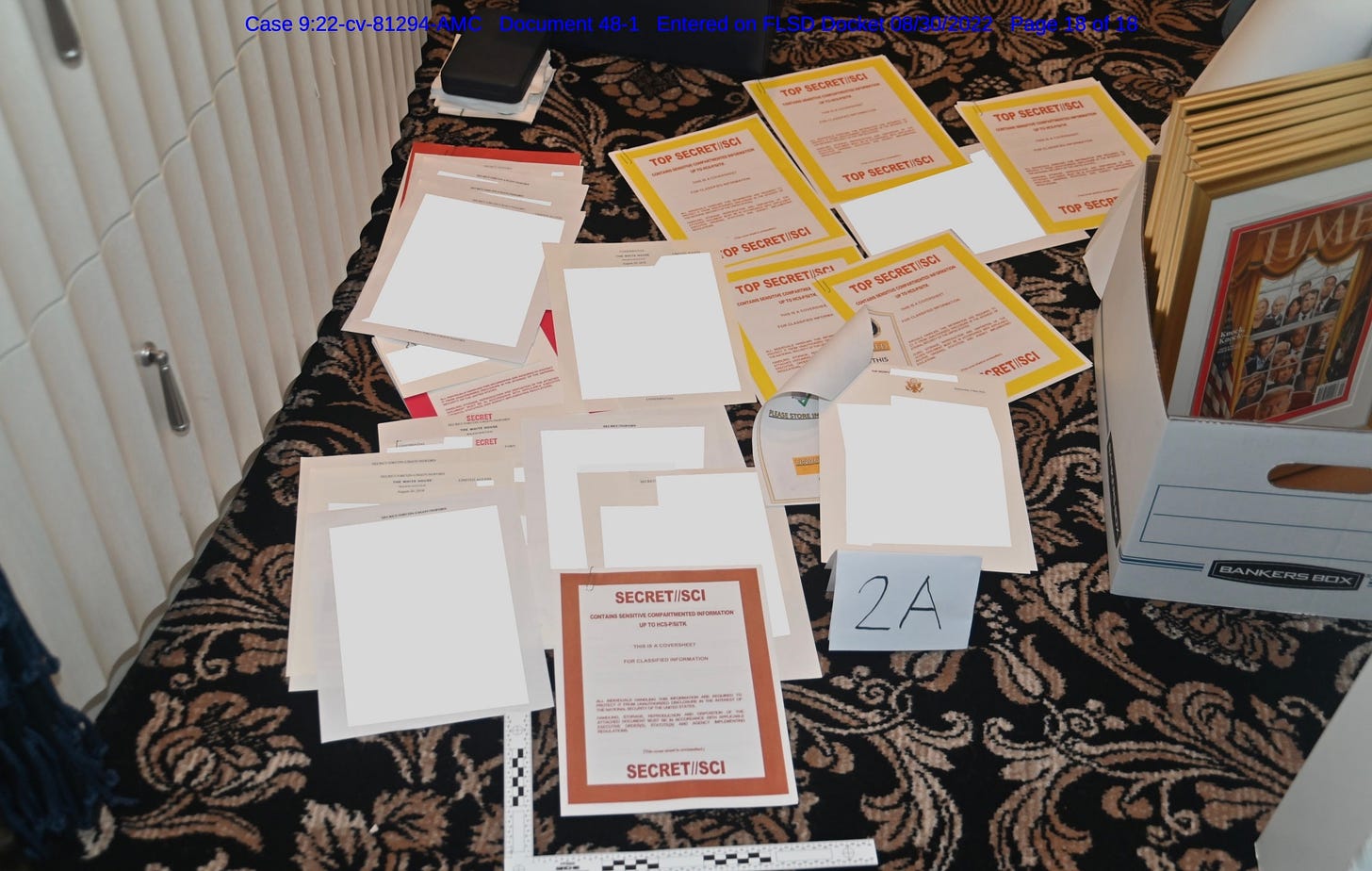DOJ just filed its response to Southern District of Florida Judge Aileen Cannon’s order. Judge Cannon had previously suggested she’s inclined to appoint a special master to oversee review of the items seized during the search of Mar-a-Lago. There had been some speculation DOJ might agree to a special master (SM), but that is not the case. In fact, they trounce the idea.
Trump’s decision to ask for a SM was a big strategic error. As Merrick Garland is prone to say, DOJ only speaks in court and in its pleadings. Tonight, some lawyers at DOJ are glad Trump gave them the opportunity to set the record straight.
Front and center, we get the actual language in the declaration a Trump representative gave DOJ, certifying in June that all classified material was being returned. That, of course, wasn’t true. Will the representative take the fall for Trump and say it was their idea to make the false certification? Seems doubtful. This person, if they aren’t already cooperating with the government, may well be the best source of direct information about Trump’s role in this whole affair.
We’ll do a quick read of the memo tonight. It totals 36-pages, so this will be a few toplines and hot takes, to prepare us for the discussion in the days ahead.
We many learn still more about what the government seized from Trump:
DOJ confirmed that it complied with the court’s order to file a more detailed list of the materials it removed from MAL under seal. In a footnote, DOJ says that in the “extraordinary circumstances” of this case, it’s willing to unseal that document and provide it to Trump. Once unsealed, there’s no reason the rest of us wouldn’t see it too, unless it was unsealed only for Trump, which DOJ doesn’t suggest here.
2. DOJ tells the court there are multiple reasons to reject Trump’s request to appoint a special master:
First, DOJ says Trump doesn’t have standing to ask the court to act because the documents aren’t his in the first place; they are presidential records that belong to the United States. “Because these records do not belong to Plaintiff, Rule 41(g) gives him no right to have them returned.”
DOJ points out that its reasons for rejecting Trump’s case are independent, in other words, if the court accepts any one of them, even if it rejects the others, it would have to reject Trump’s demand for a SM. The first argument is powerful and compelling, and if the court chooses to, it could deny Trump’s requests just on that basis. But wait, there’s more.
Next, DOJ argues the court lacks jurisdiction to consider Trump’s 4th Amendment claims, asking for return of items to him. This is because the search warrant authorized seizure, not only of classified material and presidential records, but of co-located items. Trump can’t succeed without offering evidence DOJ acted in bad faith, which he hasn’t done. In fact, there is a long recitation in DOJ’s response of efforts to encourage Trump to voluntarily return presidential records, including agreements to extend the time for Trump’s lawyers to respond at various stages of the proceedings.
DOJ says that because these arguments lack merit, the court should reject Trump’s request for a SM and decline to grant a preliminary injunction to prevent DOJ from continuing its work. Their argument makes sense. The government is entitled to hold onto evidence it recovers during a search—that’s the whole point, building a case. As long as retaining items is reasonable, which DOJ explains it is here, there’s no special rule that permits former presidents to get their hands back on items that weren’t theirs in the first place and that the government is entitled to hold.
Finally, DOJ tells the court that even if it had jurisdiction, a SM is unnecessary because it has already completed its review of the seized items, using its filter team to screen out materials potentially protected by attorney client privilege. Beyond that, appointing a SM would damage governmental interests including national security, by interfering with the risk assessment the intelligence community is conducting.
3. More detail regarding what led to the search:
There is a rehash of the timeline leading up to the search, necessitated, DOJ tells the judge, because she is not the judge who signed off on the search warrant (hint, hint). DOJ reviews the initial recovery of 15 boxes of materials in January 2021 by the National Archives, which led to the discovery of classified material. That led them to subpoena anything that remained behind at Mar-a-Lago. They received a few more documents and importantly, a certification from the custodian of the records saying everything was being returned, in June. The paragraph that details what happened after the June visit is illuminating:
“Through further investigation, the FBI uncovered multiple sources of evidence indicating that the response to the May 11 grand jury subpoena was incomplete and that classified documents remained at the Premises, notwithstanding the sworn certification made to the government on June 3…The government also developed evidence that government records were likely concealed and removed from the Storage Room and that efforts were likely taken to obstruct the government’s investigation.”
You’d hate to be the person who signed off on this certification after reading that.
4. DOJ sticks the pin on the donkey’s tail:
Trump will have an increasingly difficult time arguing he didn’t know classified materials were transferred from the White House to MAL and continued to be there. For starters, DOJ flags classified materials found in the “45 Office,” a location the magistrate judge previously found DOJ had probable cause to search: “Three classified documents that were not located in boxes, but rather were located in the desks in the “45 Office,” were also seized.”
Then, DOJ knocks out Trump’s complaints about his seized passports and his argument DOJ improperly seized them and admitted as much by returning them. They explain the passports were properly seized because the search warrant authorized them to take materials that were found with classified materials. And here’s the kicker, the passports where in a desk drawer that contained classified material, rather neatly linking the former president to that material.
There are hints that other personal items link Trump to the classified material (as if having it in his office isn’t enough, but we all know the former president, he’ll try to wiggle out of it). Later in the response, DOJ notes, “certain personal effects were commingled with classified material in the Seized Evidence, and they remain in the custody of the United States because of their evidentiary value.” The likely reason those personal items have “evidentiary value” is because they connect Trump to the classified material.
DOJ doesn’t come out and say that Trump concealed materials, but they might as well have. DOJ is certainly dismissive of the supposedly thorough search in June, noting “That the FBI, in a matter of hours, recovered twice as many documents with classification markings as the ‘diligent search’ that the former President’s counsel and other representatives had weeks to perform calls into serious question the representations made in the June 3 certification and casts doubt on the extent of cooperation in this matter.”
5. A nice dig
Is DOJ just making a comparison to another case or are they taking a shot at the former president’s legal team? It seems like it’s the later when they dismiss Trump’s request for a SM as too late to be meaningful, noting that former Trump lawyer Michael Cohen’s legal team made their request for one the same day his office was searched. Trump certainly won’t appreciate being told his lawyers aren’t as good as the legal team that represented someone who betrayed him.
6. Does the President have executive privilege against the executive branch?
It’s getting late, and this isn’t the time for nerdy, detailed, legal arguments, so I’ll just flag this one. We all know about executive privilege at this point. A president, or here, a former president says, I’m entitled to candid advice from my advisors so I can make the best possible decisions. So, my deliberations are protected from disclosure. Trump, yet again, is trying to use that argument to reclaim materials taken from Mar-a-Lago.
It’s a silly argument, because the documents don’t belong to him, they belong to the people. But even if they were his, he wouldn’t be entitled to get them back on this basis.
Executive privilege applies in appropriate circumstances when an entity like Congress, representing the legislative branch of government, seeks records from the executive branch. But, DOJ points out, just like the president, it’s part of the executive branch. And when the executive branch seeks documents from the executive, there is no privilege to apply, because the privilege is grounded in the notion of separation of powers. Applying this same logic, the White House counsel’s office turned over documents to Special Counsel Mueller’s team during his investigation. This isn’t any different. And the more DOJ chips away at the executive privilege argument, the more it enhances its ability to obtain evidence in this and other legal proceedings.
7. A picture’s worth a thousand words
DOJ brought receipts. This is an FBI photograph of classified documents and cover sheets (the blank white pieces of paper are redacting classified material) recovered from a container in Trump’s office. The agents who found these materials must have been shaken to their core. Top Secret classification is reserved for material that could do grave damage to our nation.
This photo really make me twitchy.
Perhaps the compelling image of Trump’s utter contempt for the risks taken and sacrifices made by people who work to protect this country will hit the mark with some of the people who continue to support him. Any prosecutor. would be pleased to have a photograph like this to put in front of a jury, if the attorney general decides to prosecute. And this is only one of the pictures the FBI took during the search. There’s more.
I hope this quick zip through DOJ’s response helps you get up to speed. The hearing on Trump’s motion is Thursday afternoon, to be followed by a ruling from the judge, which could come then or at a later date. We’ve learned a lot more about DOJ’s view of what’s going on at Mar-a-Lago tonight. It will be interesting to see whether anyone on the Republican side of the aisle decides it’s time to get off of the Trump train, as the evidence against him mounts.
We’re in this together,
Joyce








Wow. Thank you, Joyce, for staying up so late to get us up to speed. May our Country live up to its long-held belief that no one is above the law.
I’m only up still because my paramedic daughter took the LSAT and scores come out at 6am tomorrow. She thrives on the promise of the adventures that await her. 🤞🏽🎉
Thank you for this. That photo of top secret materials (my blood pressure is rising) in the same space as framed magazine covers is a look inside a careless, nefarious mind.